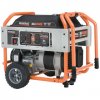Calling Mr. Boehme.........calling Mr. Boehme.............
I have on order an 8000 running watt, 10000 starting watts generator [Generac XG8000e] and was wondering in the unlikely event I have a power outage while I have a project on the lathe, if it would be okay to use back up power from the generator to run the lathe to finish it. I did not know if it would hurt the inverter, fry circuit boards, etc?
My big lathe has a brushless 2 hp D/C motor with inverter and my midi has a 1 hp A/C motor with inverter. Any issues you think might put my lathe electronics at risk?
Any others with solid electrical knowledge are welcome to chime in!!! Thanks!
I have on order an 8000 running watt, 10000 starting watts generator [Generac XG8000e] and was wondering in the unlikely event I have a power outage while I have a project on the lathe, if it would be okay to use back up power from the generator to run the lathe to finish it. I did not know if it would hurt the inverter, fry circuit boards, etc?
My big lathe has a brushless 2 hp D/C motor with inverter and my midi has a 1 hp A/C motor with inverter. Any issues you think might put my lathe electronics at risk?
Any others with solid electrical knowledge are welcome to chime in!!! Thanks!

